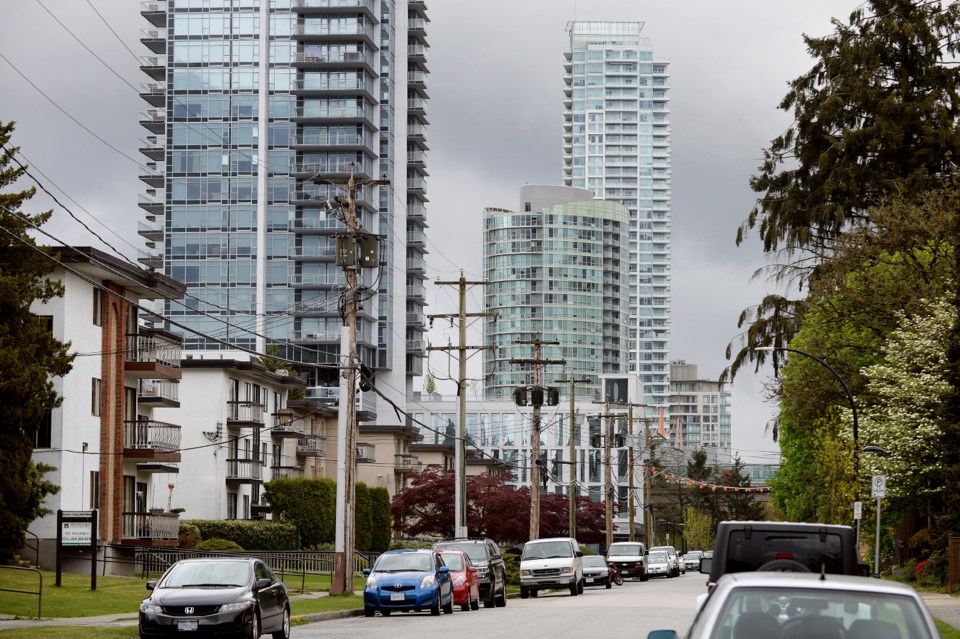It’s something that’s been repeated at city hall for more than 20 years: Burnaby can’t stop redevelopment because municipalities can’t create rental-only zones.
The B.C. government, it seems, has now heard the city’s cry, and the repeated requests of the Union of B.C. Municipalities. Last week, the province announced it was working on a law that would allow municipalities to limit tenure of residential land to rentals through a new zoning tool that could protect existing rentals and zone property as rental-only in the future.
The tool, which would be optional for local governments, is just one item on a list of moves the provincial government has recently announced in its efforts to improve housing affordability. But whether or not a rental zoning tool will improve Burnaby’s current housing situation is undetermined.
Craig Jones, UBC researcher in the geography department, studies how cities address the loss of aging rentals. Since the city approved the Metrotown Downtown Plan in July 2017, that area has seen an increasing number of existing rental units replaced with luxury condominiums. Giving municipalities the ability to zone for rental could mean the city could stop what’s happening in Metrotown from continuing.
“If Burnaby chooses to, it can tell the development community that, if you want to buy and redevelop here, you are building rental,” Jones told the NOW. “If Burnaby accepts that it is important to get a large supply of rental in Metrotown, then they can require that rentals get built. They can stop having to incentivize.”
Burnaby council already has tools to incentivize rentals, like the density bonus program that allows developers to build more housing units in exchange for a community amenity, or a donation to the city’s housing fund. For cash contributions, 80 per cent of that money goes into one of the town centre funds, and 20 percent goes into a housing fund, which has accumulated $87 million to date.
The city can also provide land for development of non-market housing, lease city lands, defer city fees and fast-track approvals. Inclusionary zoning, which requires that large developments include some affordable or special-needs housing, is another tool.
But even if Burnaby changes the zoning, those hoping for fast relief will be disappointed.
“It’s not going to be affordable rental,” said Jones. “It’s still market rental, but it may potentially slow the redevelopment process down a bit.”
However, more purpose-built rental stock, even if it is expensive today, will help housing affordability in the future, he says. Metro Vancouver hasn’t seen any major investment in purpose-built rentals since the ’80s. It has instead relied on condo rentals and secondary suites. Those types of housing are less secure for renters and do not become more affordable over time.
It’s also unlikely this zoning tool could be used in Metrotown because of the city’s existing community plan for that neighbourhood, according to Mayor Derek Corrigan.
“I don’t anticipate it, but we’ll review and see whether or not we can accommodate it,” he told the NOW.
Though the city has been asking for this power since the early ’90s, and again when the city began developing plans for the town centres, it’s probably too late for Metrotown.
“The reality is, once you’ve already done a community plan, and you’ve given someone what their expectations will be, it’s very difficult to come in and plant rental on top of it,” Corrigan said. “I doubt that it’s going to be an option where community plans are already in place, because investment decisions have been made based on what we determined would be an appropriate use.”
Corrigan pointed to Edmonds as an area where the tool could be used.
“In areas like Edmonds, where we have existing rental buildings that have not been up-zoned under the community plan, we’ll be able to say, all right, you can up-zone, but only if you replace with rental,” he said. “If you’re going to give them the gift of additional density, then we have a right to determine what that kind of density will be.”
That’s a thought Vancouver commercial Realtor David Goodman supports. While, in general, he says the rental zoning could be a good idea, he’s concerned how it would impact property values.
Developers have already made major financial decisions and commitments based on the Metrotown plan, he said. If city council decided to only allow up-zoning for rental housing proposals, that could trigger legal action by developers who bought properties with the intention of turning them into condominiums.
“You would have a major revolt from the development industry,” Goodman said. “To go into Metrotown and reverse everything that’s been done for the past 10 years would be a very, very onerous move by government that would call into question everything (local) government has legislated that now it’s all open to review. … You can’t just impose that on the developer on a whim.”


